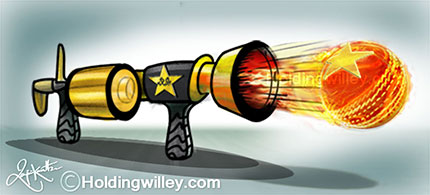 There is a theory of modern cricket politics – unproven, but informed and inferred - that the sport is in the process of domesticating itself. The popular and commercial success of the Indian Premier League has established the possibility of financial self-sufficiency, or at the very least financial support, for international boards otherwise mutually dependent on international bilateral series for revenue.
There is a theory of modern cricket politics – unproven, but informed and inferred - that the sport is in the process of domesticating itself. The popular and commercial success of the Indian Premier League has established the possibility of financial self-sufficiency, or at the very least financial support, for international boards otherwise mutually dependent on international bilateral series for revenue.
Of course, replicating the mercantile successes of the IPL, unique to India’s vast population and turbocharged economy, in other countries is at best optimistic and at worst naive, but that doesn’t mean other boards won’t try, nor should it. Cricket’s international relations are driven by self-interest and greed and are almost entirely unregulated. Governing boards would be foolish to miss any opportunity to insulate their finances from an increasingly unstable international market.
The Pakistan Cricket Board (PCB) know that instability better than most. If it wasn’t for the Lashkar-e-Jhangvi terrorist attack on the Sri Lankan team bus in 2009, there is a possibility that the ‘Big Three’ - the Board of Control for Cricket in India, Cricket Australia and the England and Wales Cricket Board - who took control of the International Cricket Council last year, could well have been a 'Big Four’ with the PCB completing the quartet.
“
As it is the PCB, unable to host international cricket in Pakistan since 2009, remains financially tested and more embarrassingly has spent the last year desperately imploring the BCCI to fulfil the first of a promised six hugely lucrative bilateral series between India and Pakistan. A promise, incidentally, that was made as a sop for the PCB to vote through the Big Three takeover of the ICC. All is fair in love, war and, it seems, cricket diplomacy.
”
But regardless of the rights, wrongs and immensely complicated politics of the stagnated Indo-Pakistani cricketing relations, the PCB’s financial reliance on India, as for rest of the cricket world, has been conspicuously evident of late.
It is within this economic climate that the PCB have unveiled the Pakistan Super League, a new, franchise-based, domestic T20 competition. The PSL, officially launched in Lahore in September and scheduled to be played for the first time, at the third attempt, next February in the United Arab Emirates, is perhaps the most lucid manifestation yet of the changing forces shaping the modern game. The international community has, quite literally, left Pakistan; so, over to you domestic T20.
Elsewhere recently, boards such as Cricket Australia, the Bangladesh Cricket Board, Sri Lanka Cricket and the West Indies Cricket Board have been evasively coy about the financial motivations behind their own revamped T20 competitions. There has been no such obfuscation from the PCB.
“The PSL will need to make the PCB self-sufficient because it is not easy to run cricket from ICC revenue alone and our board will now be stronger,” said PCB Chairman Najam Sethi in September. “We know that we will get handsome amount from the league. Right now we are looking to the Pakistan-India series to get a good revenue but with the PSL, that position will certainly change.”
What is so fascinating about the PSL is that the PCB, security and diplomacy troubles aside, should be an administrative powerhouse in the world game. Pakistan has the sixth largest population in the world (second amongst ICC Full Members) and the 42nd largest economy in the world (fifth amongst ICC Full Members) and a passion for cricket wound deep into the fabric of the nation.
The PSL, hosted in the UAE, sadly away from home fans but free from security concerns, and independent from the vagaries of international interdependence, could be a significant step towards the PCB beginning to fulfil their administrative potential.
But most importantly of all, away from the politics, away from the money and away from the diplomacy, the thing that resonates about the PSL is what it means - not to the administrators or to the corporate investors or the marketing managers, but to the people of Pakistan; the fans of Pakistan. Because even though the league will not be held in their country, it gives a nation whose cricketing psyche is deeply aligned with T20 something to represent them in this new age, something, hopefully, to be proud of.
The PSL can put Pakistani cricket back on the map.